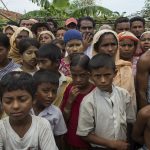Originally published in Malaysiakini.
The integrity of the Malaysian government’s strong rhetorical support for the safety and protection of Myanmar’s beleaguered Rohingya minority got put to the test last week. And Malaysia failed to deliver.
On dangerously overcrowded boats, hundreds of Rohingya seeking refuge in the country from oppression and violence in Myanmar’s Rakhine state learned that the hard way.
When they entered Malaysian territorial waters after making their perilous journey from Myanmar, Malaysian naval craft intercepted them, denied them permission to come ashore, and steered them back to open sea.
The official justification for that blatant denial of the universal right to seek asylum for a cruelly persecuted minority? The government’s concerns that “undocumented migrants who try to enter Malaysia either by land or sea will bring (Covid-19) into the country.”
The authorities did so despite the fact that those fleeing persecution are protected under international law, and the United Nations Refugee Agency (UNHCR) has confirmed that countries must not deny entry to asylum seekers solely because of the Covid-19 pandemic.
All states have an obligation to address legitimate concerns about transmission of the novel coronavirus during this pandemic. But that should not be a pretext to deny refugees the right of asylum.
Malaysian authorities could and should have tested the Rohingya refugees for coronavirus and then appropriately isolated or quarantined them to prevent possible transmission of the virus.
Instead of undertaking such basic screening measures that would have ensured both Malaysian public health imperatives and the lives of the Rohingya refugees, the navy forced them to continue their perilous journey in search of safe harbour.
The dangers that the Rohingya face when they flee Myanmar by sea cannot be underestimated. The Bangladeshi coast guard reported on April 16 that at least 60 Rohingya died and hundreds of others were found starving on a boat that had previously been turned away from Malaysia.
In 2015, intolerable conditions in Myanmar prompted thousands of Rohingya to attempt to flee the country by boat to neighbouring Malaysia and Thailand. A humanitarian crisis ensued when authorities in those countries denied them entry, resulting in an estimated 8,000 Rohingya stranded at sea for weeks after their smuggler boat crews abandoned them.
The timing of the Rohingya refugees’ arrival to Malaysia this month coincides with an escalating Myanmar military offensive in Rakhine and Chin states. The Myanmar military, or Tatmadaw, claims to target the insurgent Arakan Rohingya Salvation Army, which is seeking to establish a breakaway Rohingya state.
The Tatmadaw is notorious for egregious abuses of the rights of Myanmar’s ethnic minority populations and the offensive has already reportedly claimed the lives of eight civilians in Rakhine.
Malaysia’s unwillingness to provide refuge for the fleeing Rohingya is incongruous with its official expressions of support for the persecuted minority in the wake of widespread and systematic violence against the group by Myanmar security forces in Rakhine in 2017.
Then foreign minister Saifuddin Abdullah issued an unambiguous call in June 2019 for the perpetrators of that slaughter “to be brought to justice.” Then prime minister Dr Mahathir Mohamad declared a month later that the Rohingya were the victims of a “genocide” that merited them their own sovereign “self-governing territory.”
Mahathir declared in September 2019 that the Rohingya had been targets of Myanmar government “institutionalised terrorism,” that included “mass killings, systematic rape and other gross violations of human rights (that) resulted in Rohingya fleeing the country en masse.”
New Prime Minister Muhyiddin Yassin, who took office in March, should not only repeat those assertions of support for the Rohingya, but bridge the gap between that rhetoric and action by accepting desperate Rohingya asylum seekers onto Malaysian soil.
Muhyiddin has an opportunity to demonstrate that states can and should balance public health concerns during the pandemic with the essential duty of every state to respect the right of asylum for victims of persecution.
The Rohingya risking their lives to flee oppression and violence in Myanmar deserve nothing less.

